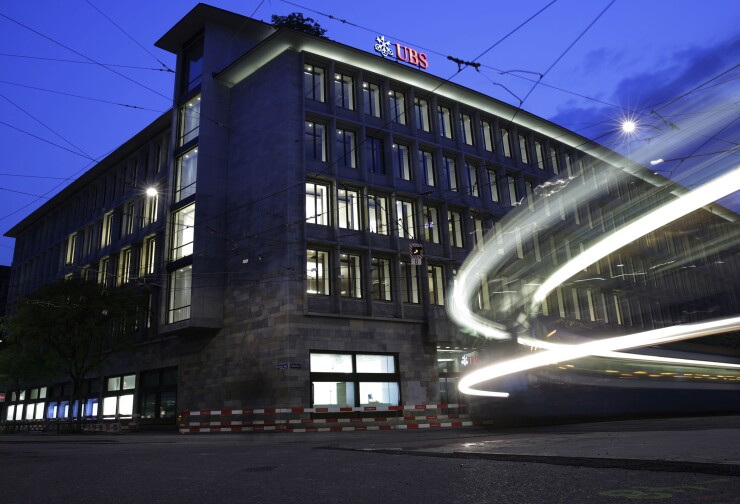UBS Group owes $903,300 to a former senior strategist who claimed he was fired for refusing to sugarcoat his reports for clients.
A Manhattan federal court jury on Thursday sided with former top commercial mortgage-backed securities strategist Trevor Murray, who accused the Swiss lender of illegally firing him in 2012 for blowing the whistle on attempts by CMBS traders to influence his independent research reports. But the panel rejected Murray’s request for at least $3 million in damages and ordered the bank to pay less than one-third of that.
After the verdict was read, U.S. District Judge Katherine Polk Failla told the two sides to try settle the case before filing further motions, warning of lengthy delays from appeals and a possible retrial.
"See if this jury’s verdict offers you a third-party perspective," Failla said.

Murray, 46, accused UBS of violating the whistle-blower protections enacted as part of the 2002 Sarbanes-Oxley law. He described a "concerted, extended effort" by managers and colleagues to get him to write bullish assessments during his roughly one year of employment.
"This jury found that UBS mistreated Mr. Murray when they terminated him, and that is the most important thing about this verdict," his lawyer, Robert Herbst, said. "This bank committed misconduct and should be ashamed for what they did to Mr. Murray."
UBS argued that Murray was never a whistle-blower, and that his termination was part of a broader reduction in staffing caused by the bank’s poor finances. The bank repeatedly stressed the impact of a $2 billion loss by a rogue trader at UBS’s London office five months before the firing.
Jurors deliberated for two days.
“We are disappointed in the jury’s verdict and believe that the record in this trial clearly shows that Mr. Murray was not a whistle-blower or retaliated against in any way," UBS said in a statement. "We are reviewing our next steps.”
The bank may ask for the judge to reject the verdict. Last month, a jury in the same Manhattan courthouse found that a former JPMorgan Chase wealth manager had been fired illegally and awarded her $1.13 million in damages. A judge then called the verdict flawed and threatened to toss out the decision unless the parties settle.
Murray blamed David McNamara, a UBS managing director and head of CMBS trading, saying he demanded to "preclear" drafts of Murray’s reports in violation of UBS policy. Murray also accused his ex-boss, Kenneth Cohen, a well-known figure in the CMBS market, of complaining that his reports were "off-message" and setting the alleged preclearance process in motion.
Murray testified that Cohen told him in a hallway of UBS’s Manhattan office not to “write anything negative about the hotel sector” because the bank was working on financing for the Fontainebleau Miami Beach hotel. He said he wrote the report anyway, alerting clients to his concerns.
UBS denied the allegations, with its attorneys telling jurors that Murray had a “shocking” lack of evidence backing his claim, such as emails or text messages in which he complained to friends or colleagues about the alleged interference.
McNamara took the stand, recounting how UBS’s CMBS business struggled as a result of the bank’s broader financial problems, including a $2 billion loss by a rogue trader at its London office in September 2011.
While Murray was on the stand, UBS’s lawyers pressed him about why he certified each of his reports as independent if he’d been influenced by his colleagues. Murray said he’d lied by certifying the reports — something the bank highlighted in a bid to undermine his testimony.
The case is Murray v. UBS Securities, 14-cv-00927, U.S. District Court, Southern District of New York (Manhattan).





